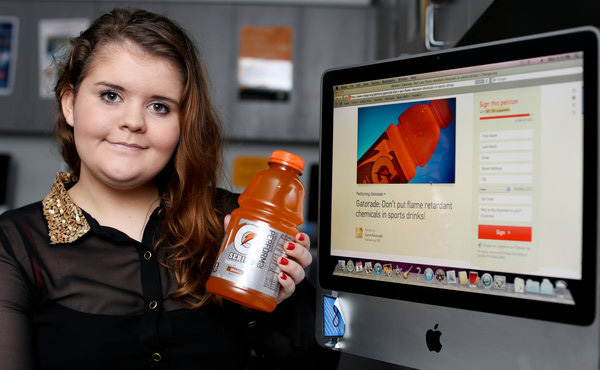UPDATE 1/29/13: After more than 200,000 signatures on a Change.org petition, PepsiCo has announced it will remove the flame retardant it currently uses in Gatorade. However, the company doesn’t not plan to issue a recall on products in market that still contain the BVO, or Brominated Vegetable Oil.
About a month ago, a 15-year-old teenager named Sarah Kavanagh was looking forward to the Gatorade she had stored in her fridge for after her long afternoon of playing outdoors in the humid heat in Hattiesburg, Miss.
With Sarah being the dedicated vegetarian that she is, out of habit she checked the ingredient list on the drink before popping open the top. While making sure none of the ingredients were made from any type of animal, she noticed it contained brominated vegetable oil. Though it had the word vegetable in it, Sarah still felt like investigating further.
“I knew it probably wasn’t from an animal because it had the word vegetable in the name, but I still wanted to know what it was so I Googled it,” said Sarah. “A page popped up with a long list of possible side effects, including neurological disorders and altered thyroid hormones. I didn’t expect that.”
Needless to say, Sarah threw the drink away without a sip or hesitation. She then began an online petition on Change.org where she now has nearly 200,000 signatures. Sarah’s hoping that she can get enough supporters that will persuade Gatorade’s maker, PepsiCo, to make some changes to the recipe.
B.V.O. contains an element that is found in brominated flame retardants that are used in items such as children’s products and even some furniture. Studies have taken place that show build up of the substance in the human body, breast milk and animals. Side effects have been linked to it causing things such as reduced fertility, puberty at an earlier age, changes in thyroid hormones and neurological impairment.
In other parts of the world, such as Japan and the European Union, the use of the substance has already been banned, and a replacement ingredient has been made to do the same job.
“I don’t see why they don’t just make the switch,” said Sarah. Current companies who use the ingredient in the U.S. use the excuse that the switch would be much too costly. No doubt like Sarah, we have to wonder if the switch would be more costly than the health problems it causes.
One of PepsiCo’s spokesmen, Jeff Dahncke, said that the debate over the use of the substance has already been conversed over the last three decades, and it has been approved as safe by federal regulations. Another reason its use hasn’t been banned is because it helps separate the fruit flavoring evenly. As of now, PepsiCo has no intentions of changing any of their drink recipes.
Some of the other drinks containing the substance include Mountain Dew, Powerade, Fanta Orange, Fresca, Squirt and Sunkist Peach Soda. Nearly 10 percent of drinks distributed in the U.S. contain brominated vegetable oil.
Also Read:
The 25 Most Popular Diets of 2025
9-Year-Old Loses 66 Pounds with “Tough Love”
Helping Your Child Athlete with Hydration
image via nytimes.com

